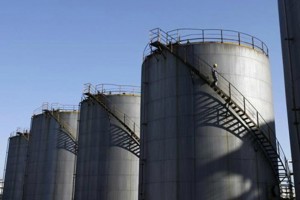Diversify or die: China's independent oil refiners adapt to new challenges
BEIJING (Reuters) -- Cut off from lucrative fuel export markets and seeing their margins squeezed by new taxes, China's independent oil refiners are branching out into new sectors from clean energy and lumber as well as expanding their trading to overcome the challenges.
These independents, known as "teapots" since they are smaller companies than their state-owned rivals, are scrambling to survive shifting government policies at the same time domestic oil demand growth is slowing, undermining their ability to expand by just serving their home market. In 2016, China's annual fuel demand growth was at a three-year low.
"The good days won't last much longer, as China's oil demand has been shrinking," said Zhang Liucheng, vice president of Shandong Dongming Petrochemical Group, the country's largest independent refiner.
Late last year, Beijing suspended fuel export quotas for the independents, handing control of diesel and gasoline exports to the dominant state refiners.
Other government moves may also squeeze the independent's margins. Top state refiner Sinopec overhauled its fuel buying policy by centralizing all purchases at its Beijing headquarters and China plans to slap consumption taxes on refinery by-products such as light cycle oil, sold as diesel, and mixed aromatics, which are added to gasoline to improve fuel quality.
"They had already been diversified and nimble at working around the various government mandates...now they are definitely looking for ways to step up their game and have better people, global access and financing to do so," said Michal Meidan, analyst at consultants Energy Aspects.
Executives at some of China's top independent refiners outlined to Reuters their plans to diversify to endure these changes.
Dongming, for example, plans to add a 800,000 tpy naphtha cracker, extending its business from transportation fuels to higher value plastics and synthetic rubber as well as fine chemicals, said Zhang.
The 260,000-bpd refiner is also looking to invest in small-scale onshore fields, said Zhang.
Zhang also aims to boost trading operations by combining physical oil and gas trading with financial services such as offering credit facilities for fellow teapots at better rates than banks.
Underscoring how much Beijing has prioritized clean energy, Shandong Haike Group said it will open this month a factory that makes electrolytes used in lithium batteries for electric vehicles.
The company said the plant will be the country's largest with the capacity to produce 100,000 t a year. It also plans to grow its pharmaceutical business but has no plans to expand its refining capacity.
UNCERTAIN FUTURE FOR TEAPOTS
Shandong Chambroad Group plans to move into lumber processing to develop a special building material for villa cottages and gardens, said chairman Ma Yunsheng.
In addition to the policy actions against them, the teapots have lost a major advocate with the departure of Shandong provincial governor Guo Shuqing, which further shrouds their future, said Energy Aspects' Meidan.
Newly installed Shandong party chief Liu Jiayi could try to tackle overcapacity and pollution in the province, which would add to pressure on the independents, she said.
For some, the expansions are an opportunity to move from a small local operation into a global company.
Shandong Hengyuan Petrochemical Co, a refiner backed by a local government and the first teapot to own a refinery abroad, wants to become a regional player, combining assets at its home base in Shandong with the refinery in Port Dickson, Malaysia, that it recently acquired from Shell.
As part of the expansion, it will set up a trading desk in Kuala Lumpur to secure crude for the two plants with a combined capacity of 160,000 bpd and also supply 4 MMt of fuel annually to Shell under a 10-yr pact.
"Without differentiating yourself, the competition will be tough," said Hengyuan's chairman Wang Youde.
Reporting by Chen Aizhu; Editing by Josephine Mason and Christian Schmollinger







Comments